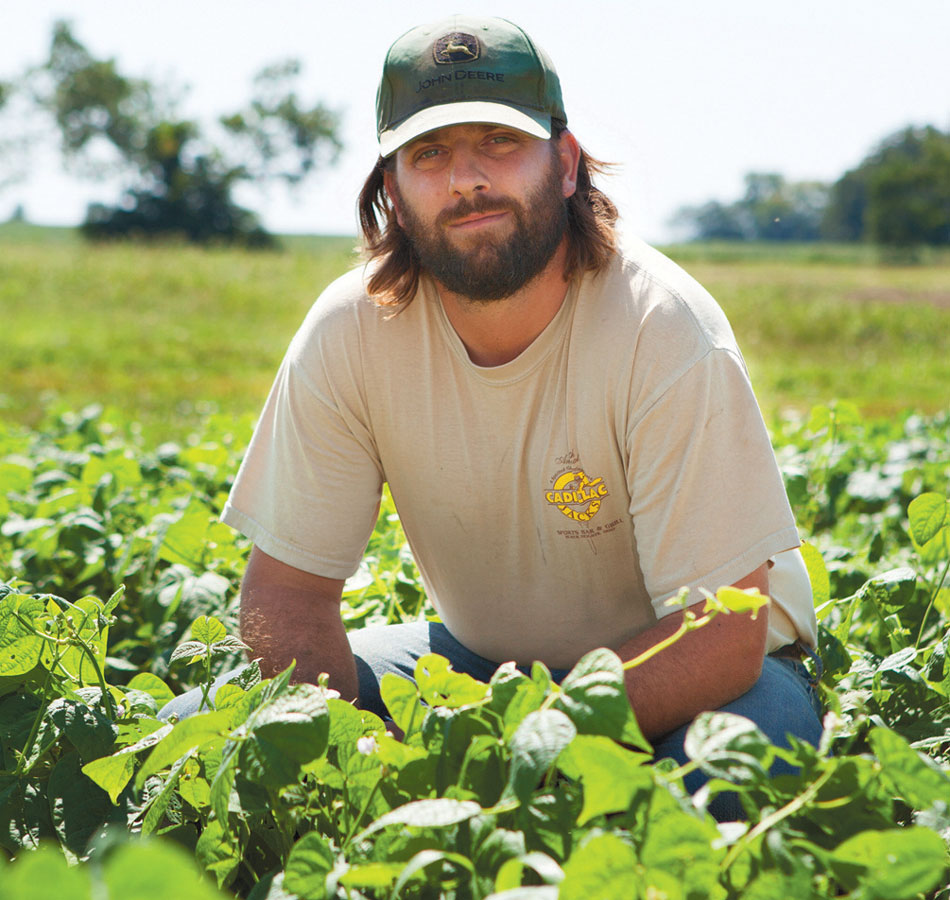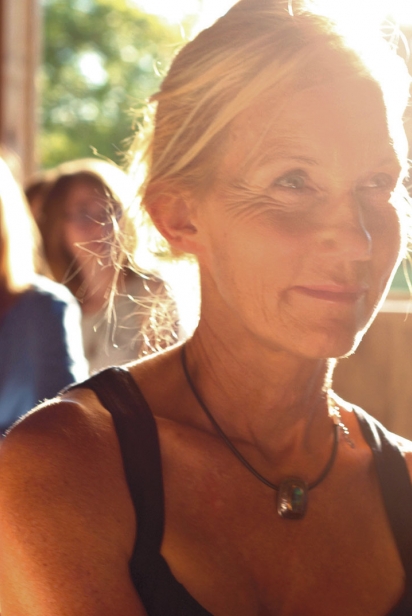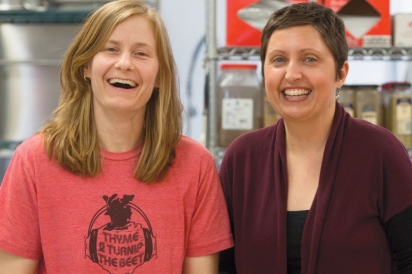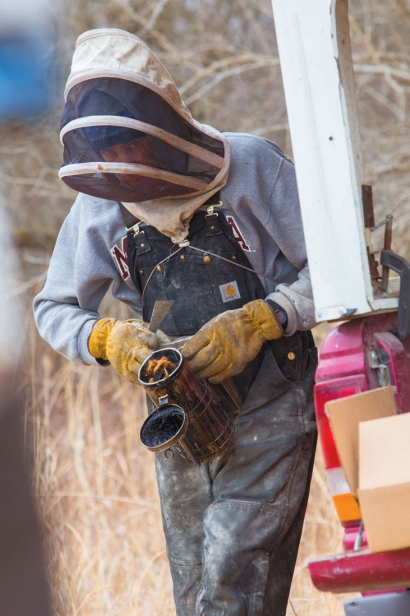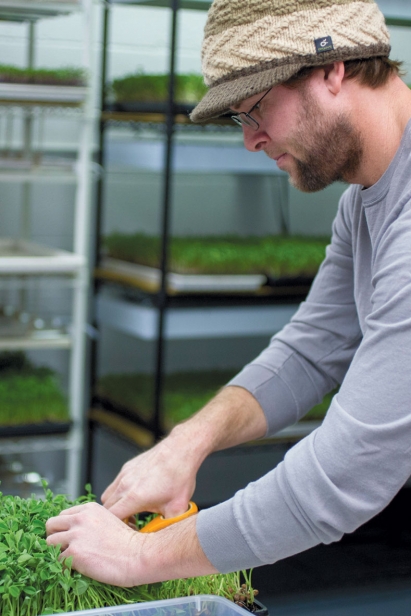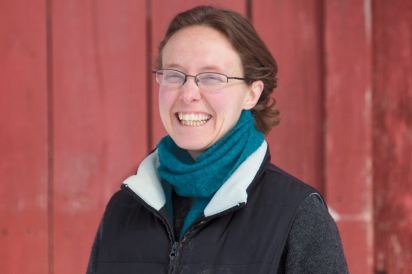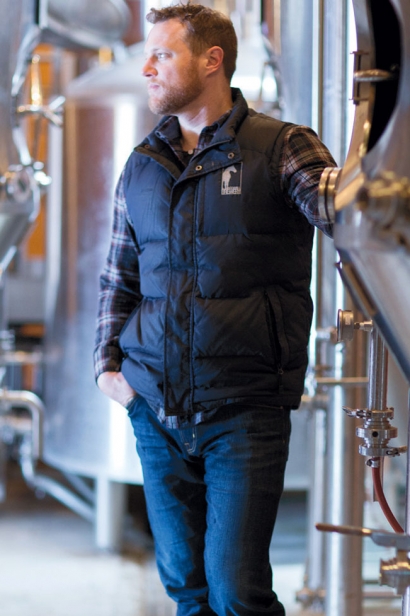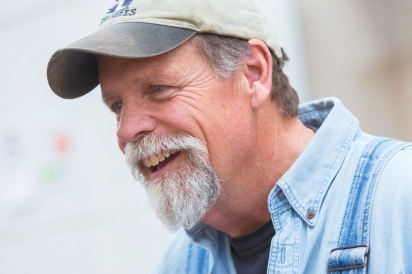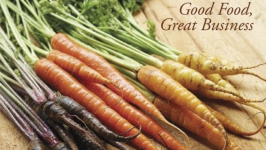Where Are They Now? Central Ohio's Good Food Cultivators
A look at some of Edible Columbus’ favorite folks and the good food work they’re cultivating in Central Ohio
This spring Edible Columbus celebrates its sixth anniversary. As we reflected on all of the growth over the past six years in preparation for this issue, we wanted to look back at some of our favorite farmers and food producers we’ve written about to see what they’re up to now. What has changed? What new challenges are they facing? What are their plans for the future?
As you read about Wayward Seed, Jorgensen Farms, Luna Burger, Honeyrun Farm, Swainway Urban Farm, The Kale Yard, Rockmill Brewery, and Stonefield Naturals, know you are surrounded by so many more good food rock stars who are making tremendous things happen from the ground up in Central Ohio one row and field, root and shoot, bottle and barrel at a time.
Wayward Seed: Becoming a Better Farmer
Wayward Seed’s growth is one of depth. Adam Welly, Jaime Moore, Adam Utley, and the Wayward team have dug into the craft of organic farming rather than seek runaway expansion. “Wayward Seed Farm in the last five years hasn’t really grown that much from an acreage standpoint,” says Adam. “The difference now is that we’re doing it better. We’re doing it more professionally. We’re doing it with more skill and deftness that’s necessary to produce food on acre-per-acre with organic practice in mind.”
Turning their focus from growing unusual, niche crops to mineralization of their soil, Wayward now farms more consistent organic crops with higher nutritional value for their CSA. “I learned how hard it was going to be to really do this for a lifetime,” says Adam, “and that for me to have a successful farm growing broccoli and making it available to people organically was something just as unusual.” Broccoli, Adam reports, that tastes like whole grain mustard, butter, and chicken stock in one bite—a testament to the flavor true, organically grown food can carry.
And while Adam thinks the CSA model “is the best way for a consumer and farm to ever interact. The best shift of financial and cultural values that can happen in a food system,” he’s also selling wholesale, expanding Wayward’s sales by 500% in the past five years.
The future? Adam is moving the farm to Fremont, Ohio, where he and Jaime grew up. “This is where Wayward started,” he says. “This is my childhood of driving past farm after farm of tomatoes and cabbage and sugar beets and seeing things that were different besides soy and corn.” Adam is passionate about expanding the farm from a place where the soil supports what he wants to grow organically. Ballville Township is home to rich, fine, sandy loam soil—“it’s one of those special places to grow vegetables in the U.S. It has the history, it has the ecology.”
“It’s the terroir concept,” Adam says, “you go where the soil’s right to do what you want to do.”
Jorgensen Farms: Building a Passionate Team
“I enjoy challenge. I’m honestly not afraid of failure. I never want to miss an opportunity,” says Val Jorgensen, owner of Jorgensen Farms, as I ask her how she planned for tremendous expansion of the farm and its offerings over the past four years.
After investing in the Michigan State Student Organic Farm Training Program in 2011, Val was able to build five hoop houses and grow more vegetables year-round. Around the same time, weddings were descending on Jorgensen Farms, only five in 2012, and then Val hired event coordinator, Katherine Harrison, and weddings on the farm jumped to 40 in 2013. Last year, Rowan Evans was hired as community liaison for the farm, and with her partnership with Jorgensen, Val has been able to do more programming with organizations like Mt. Carmel St. Ann’s hospital, visitors’ bureaus, and a burgeoning program to bring kids to the farm in 2016.
The flourish that is Jorgensen Farms continues this year with a big move into a commercial kitchen, which will allow for more value-added products and events. “It really opens up a lot of opportunity,” Val says.
During the full growing and event season, Val’s team totals about 14 employees, some full-time. When we first featured Val, she had a team of three. “What we’re doing here on the farm takes a lot of work and I’m trusting other people with a lot. You can’t do this alone,” Val says, “I have one fellow that’s been here for 10 years working with me. My sons, Dave and Matt, I really couldn’t do this without them. Everybody who is here is here for a reason. And that’s what it takes. It’s about the people that are here. They are vital to the life of this farm.”
Luna Burger: Connecting Business and Community
“One of the core things that hasn’t changed is our relationship with the farmers,” says Megan Luna, co-owner of Luna Burger.
With the addition of two full-time employees and a handful of part-time employees during the summer, Luna Burger is now sold in 30 states nationwide. Megan and Barbie Luna credit some of that growth to Eat Well Distribution, which has served as a middleman to help them distribute to larger chains, including a recent addition of 60 Kroger stores in the Central Ohio.
Luna Burger sources its ingredients for “pure plant veggie burgers” from local farms, so much so that the farmers now want to support Luna Burger. “Now farmers are calling us and saying ‘I’m making my planting schedule and buying seeds and I want to be able to grow these things for you,’” says Megan. “Now we have a pre-season relationship with them. Now we’re helping them have a more stable crop plan. That was really part of our goal all along to help stabilize the local food system.”
What’s most near and dear to Megan’s and Barbie’s hearts, though, is “to be more connected in a social justice-oriented way to the community.” In the next year, Megan and Barbie hope to work with the Southside of Columbus and Parsons Avenue Merchants Association to develop a Healthy Food Campus and create things like an edible forest, greenhouses, and more.
Despite the challenges of managing the small steps and swells of running a capital-intensive, small, artisan food business with personal resources, Megan and Barbie credit Columbus as a huge player in their success. “I think Columbus is a great place,” says Barbie, “and a very supportive food environment.”
Honeyrun Farm: Scaling Up with the Bees
Isaac Barnes of Honeyrun Farm is a proud papa and beekeeper and Jayne Barnes, his wife and queen bee, is the better half of their life and business. Today they have four children, and Isaac is a full-time beekeeper and runs 400 abundant hives, supplying local stores and honey lovers with some of the best raw honey in Central Ohio.
It’s been a dance for Isaac and Jayne over the past few years of maintaining a balance between selling honey at farmers markets and also having enough honey to distribute wholesale. By combining pollination opportunities with natural methods to keep his bees healthy and not susceptible to Colony Collapse Disorder, Isaac has found more of a sweet spot for success. Jayne runs their online store where she sells honey, beeswax candles, soaps, and more. It’s a full-time job and a big part of the business.
All this continued growth leaves Jayne and Isaac wondering: How do we scale up? Even with more stores looking to carry their honey, Isaac has to make sure the bees can produce year to year despite volatile weather patterns, like polar vortexes in winter. “I love that Columbus has such a strong, local mentality,” says Isaac. “Several restaurants and stores have sought us out. Lately, The Guild House has been buying a lot of honey. It’s been a PR wave.”
Isaac also talks excitedly about how well the bees are doing this year and how he’s thinking there may be more spring honey produced this year than last. And he makes sure to pass the baton to Jayne: “I want to compliment her for being such a wonderful, not only wife, but business partner. It wouldn’t happen without her.”
Swainway Urban Farm: Making Urban Farming Work
“Once we proved to ourselves that we could be successful at urban farming,” starts Joseph Swain as we talk about the growth of his Swainway Urban Farm over the past several years, and prove it he did, along with a team of other homesteaders and urban farmers, including Rachel Tayse Baillieul, who is now a core part of his team and co-founder with Joseph of the newly opened Columbus Agrarian Society.
After acquiring three times more land to grow more organic vegetables, Swainway Farm has acquired a warehouse to ramp up its microgreen and mushroom production year-round, adding to a growth in sales. Stationed in Clintonville, the warehouse allows Swainway Urban Farm to operate all within a 10-mile radius, cutting back on fossil fuels and actualizing their efforts in sustainability. It will also house the Columbus Agrarian Society. “We’re trying to create an incubation and resource center to help advance other urban growers in their backyard gardens or market growing endeavors,” says Joseph. “The foundation of it is to provide intensive workshops to educate and inspire, the materials and supplies to grow more food organically, and create a community network of people working together to push this whole movement forward.”
Joseph is now at the place where he hopes “to take the time to do more things I enjoy in my personal life now that the business has the capacity to employ others.” He continues: “We are building a team of likeminded individuals that are passionate about good food and are pushing their own personal missions forward within the local food system.”
The Kale Yard: Investing in Land
“It feels like an exciting time,” says Erin Harvey, owner of The Kale Yard, a small farm now located on three acres of land in Northeast Lancaster. We’re talking about the scene in her hometown of Lancaster, how new restaurants are opening up downtown, including one of her favorites— The Well—and how the place where she grew up is now able to support more likeminded businesses focused on local, artisan foods.
When we last featured Erin she was leasing land on another farmer’s property, struggling with what a lot of young farmers face when they don’t inherit the family farm, or have the capital to invest in land of their own. Yet last summer Erin made the commitment to come back to her roots in Lancaster and buy land to continue growing choice, organic vegetables and educate others about what you can grow with a small amount of space.
Her first priority when she moved in was building a greenhouse. “That’s one of my favorite things to do—greenhouse work.” She’ll use it to start chemical- and plastic-free veggie starter plants and sampler packs to sell at the Granville Market this summer.
Her long-term goal is to work with the land, implementing permaculture techniques into her growing methods. “One of the principles of permaculture is observation,” she says, “so I am trying to be patient and live with the property for at least a year before I make too many decisions.”
And while Erin has invested in land, she’s not investing in the career of being a full-time farmer. She’s currently the manager of the Going Green Store. “It lets me work in different areas along the food chain. I love producing things and growing things, but working at the store allows me to work with a lot of other local food vendors and create other sales avenues for them. I do a lot with the Licking County Local Food Policy Council, too, and that’s really important to me.”
Rockmill Brewery: Making It a Destination
Even with Rockmill Brewery’s success over the past few years—being named one of the 100 best beers in the world by Men’s Journal for their Cask Aged Tripel, collaborating with Middle West Spirits and Seventh Son Brewing Company on vinegar and beers, and now selling their beer at high-end markets and chef-driven restaurants in New York City, Chicago, and California—owner Matthew Barbee is focused on what’s next.
“It feels great. It’s very affirming,” he says. “But I tend to focus on how we can do things better, so we’re always tweaking the beers and how we can take them to the next level.”
“We” includes his mother and brother-in-law, a tight ship for a broad base of Belgium-style ales created at Matthew’s brewing facility in Lancaster, Ohio. In the next year, he’s planning to expand his team and the land on which the operation runs.
“I really want to invest in the destination of the farm,” he says as he describes his vision for a restaurant, gastropub, microdistillery, and his dream brewing facility that is designed to house events. While he plans to keep the boutique feel of the place, he wants to capitalize on what people often say when they visit Rockmill—how it feels like wine country and they never knew a place like it existed in the Midwest. “I really want to invest in that so there is a place outside of the city where people can have that kind of experience right here in Ohio.”
For all this expansion, though, Matthew doesn’t miss a beat when it comes to his beers. His commitment to craft is as strong as ever and his willingness to experiment and explore for the sake of flavor is ripe. “In 2015 I hope we’re able to release our first sour brand,” he says. “We might also release something that has a much more significant hop profile.”
“The community is very excited about what we’re doing,” he says, and we count ourselves among them.
Stonefield Naturals: Preserving Heritage Breeds
“We’re only as good as our last pork chop,” says Al as we discuss the ins and outs of raising heritage-breed hogs. Al Dolder single-handedly runs Stonefield Naturals, and it’s a careful hand he places on the full measure of the farm.
Al cares deeply about the quality of his pork and maintaining a consistent supply to his customers at the Pickerington and Worthington farmers markets. He also cares deeply for the habitat of his hogs. This year he’s focusing on infrastructure, looking to create an indoor environment for the pigs that keeps them healthy year-round. It’ll also ensure he’ll produce more pork. “Nothing hurts me more than telling a customer that I’m out of pork,” he says. “I went through a six-week period this fall because I didn’t have the pork, and that breaks my heart.”
In plain speak and with a healthy dose of speculation for big ag, Al jumps ahead to genetically engineered (GE) feed and how he is opposed to it for his hogs given so much uncertainty around what happens to the genetics of the feed once it leaves the hog. “We have corn that if a bug bites it, the bug dies,” he says. “Now that corn is harvested. That corn is ground into feed. That corn is either consumed by us as fructose corn syrup, or animal feed. Now where does that gene go? Where does that protein go? Where does that enzyme go?” His frustration lies in not being able to get a real answer from seed men trying to sell the feed to him.
Al’s questions don’t stop there, for he is beginning to wonder what will happen to his hog operation once he passes on. “I would truly enjoy finding a youngster who is interested in it,” he says, “and showing it to them because when I’m done I want to leave these genetics to someone.”
Yet he’s not ready to quit. He says he’s got another 15 years in him. “I’m where I want to die. I think that everybody knows a place where they want to be. A lot us can’t find that place where we want to be. They just don’t feel connected to anything. I just have a strong sense of place,” Al says. “There’s just something special sometimes when we find our place.”
We think Central Ohioans are lucky he’s found it among us.


